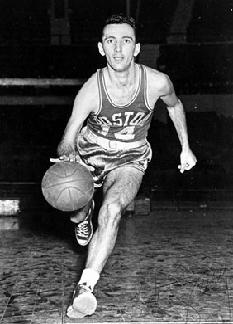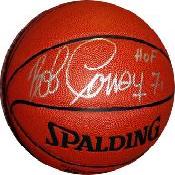 |
 |
Enshrined;
April 21, 1971
Pro Caoching:
NBA Cincinnati Royals (1969-72)
NBA Kansas City/Omaha Kings (1972-74)
Compiled a 141-209 composite record in five pro coaching seasons

It wasn't always so. The player known as "Cooz"ť was born into poverty in circa-1920s New York City, the son of poor French immigrants who came to this country in search of the Great American Dream. For the Cousy family, visions of prosperity quickly gave way to the burdens of reality. His father drove a taxi all over Manhattan’s hardscrabble East End, scraping and saving for a better life beyond the ghetto known as Hell’s Kitchen. Moonlighting put extra money in his pocket and kept food on the table, so he did that, too. It was a Spartan existence, humble by any standard, one in which the greatest ball handler of his era could not afford a basketball of his own. And yet even though his was a childhood spent squarely in the jaws of The Great Depression, Cousy he grew up blissfully unaware of the economic hardships brought on by such circumstance.
Cousy's early years were spent playing stickball on the streets, immersed in a melting pot of ethnicities that would later make him sensitive to the plight of his African-American teammates. Children coexist famously, ignorant to such differences as skin color, custom and dialect. They can be complete strangers one moment and the best of friends the next. Cousy never outgrew that. To him it was all about the stickball, not the color of its competitors. Little has changed over the past seventy years of a truly blessed life.
Cousy and his family escaped the East End in 1940, moving to the St. Albans neighborhood of Queens. He was twelve at the time. A year later he slipped and fell out of a tree, breaking his right arm in the process. It was a painful but fortuitous incident to be sure, as the lithe youngster -- this burgeoning basketball newbie -- began dribbling with his left hand. Cut twice from the Andrew Jackson High School junior varsity team, Cousy continued to hone his playmaking skills in pickup games and neighborhood leagues, catching the eye of his former JV coach and receiving an invitation to rejoin the team. In just a year and a half, Cousy became the most talked-about schoolboy basketball phenom in New York. As a senior he won the city scoring championship, securing the title by tallying 26 points in the final game of the season.
Cousy's exploits earned him a scholarship at Holy Cross, where he platooned as a freshman and thus earned a part of that team’s national championship. Head coach Alvin "Doggie"ť Julian, who later became the second head coach of the Boston Celtics, considered Cousy something of a showboater. He grew increasingly frustrated over his guard's fancy passes, preferring a far more bland method of delivering the basketball to teammates in scoring position. Whether a true player-coach friction developed is open to conjecture, but Cousy found his playing time greatly reduced and thus considered a transfer to St. Johns. Coach Joe Lapchick would not have been blamed for welcoming the young talent with open arms, but instead convinced Cousy that it would be best to remain at Holy Cross.
Cousy's perseverance was rewarded during a game against Loyola of Chicago at Boston Garden. (Holy Cross, located some 40 miles from Boston, did not have an adequate gym for hosting big games.) With 5:00 left and the Crusaders trailing, the crowd broke into the spontaneous chant of "We want Cousy! We want Cousy!" Julian ultimately acquiesced, inserting the flashy guard into the lineup. Cousy responded by scoring 11 points, including a buzzer-beating left-handed hook shot that he threw up after spinning past a much larger player with a behind-the-back dribble.

 |
"Do your best when no one is looking. If you do that, then you can be successful in anything that you put your mind to."

 |


|

|

